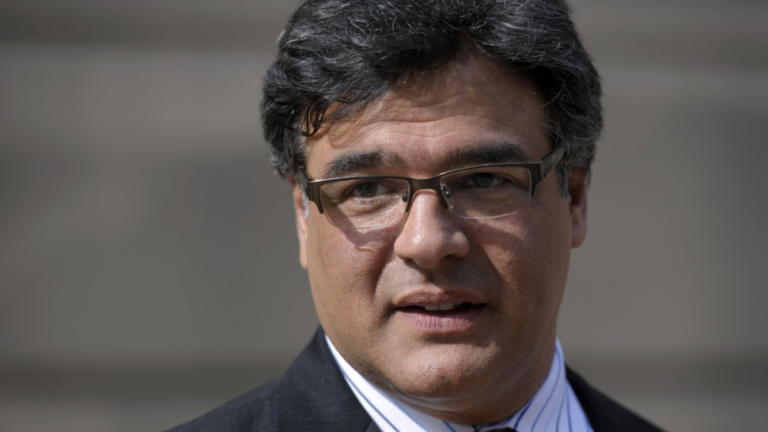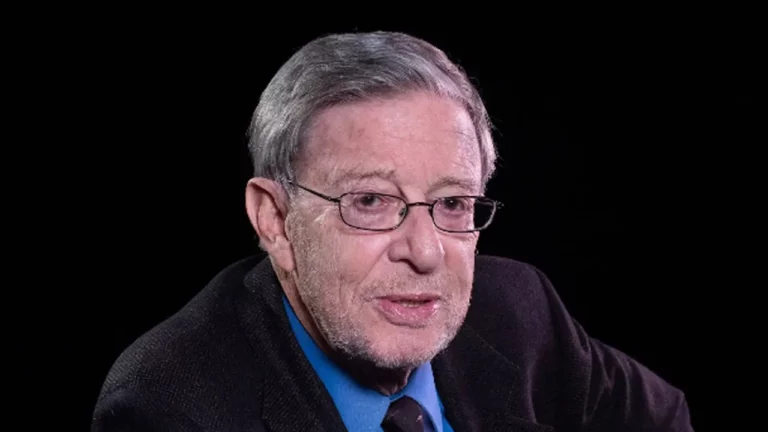This is an episode of Reality Asserts Itself, produced on May 9, 2014. Colonel Lawrence Wilkerson says US foreign policy is made by the oligarchs.
PAUL JAY, SENIOR EDITOR, TRNN: Welcome to The Real News Network. I’m Paul Jay.
This is another edition of Reality Asserts Itself. And the reality asserting itself these days is more than troubling. Geopolitical rivalry is intense and sharpening. Ukraine is just one recent symptom of the issue.
The climate is apparently already affecting the United States, according to the latest scientific reports, and the IPCC report is saying that we are facing severe crisis as we move further into this century. Yet public policy is nowhere near catching up to the extent of the crisis.
The underlying economic crisis has not been dealt with. The issues that led to the financial collapse in 2008 have not been addressed. The issues of too-big-to-fail, the issue of massive financial speculation and gambling that triggered the crisis have not been mitigated in any serious way by legislation. And most predictions are we’re heading into another global, deep recession sooner than later.
Now joining us in the studio to discuss a very serious situation is Col. Lawrence Wilkerson. Larry is a retired United States Army officer, former chief of staff to United States Secretary of State Colin Powell. He’s an adjunct professor at the College of William & Mary, where he teaches courses on U.S. national security.
Thanks for joining us, Larry.
COL. LAWRENCE WILKERSON, FMR. CHIEF OF STAFF TO COLIN POWELL: Thanks for having me, Paul.
JAY: So, in Reality Asserts Itself we usually start with a personal back story, and then we get into the some of the issues. But we actually did all that with Larry prior to even having Reality Asserts Itself. In fact, you could say the format–Larry is, like, the first person for that format before there was that format. So we’re going to link this series of interviews of Larry to that. You’ll be able to find all the earlier ones, which has a lot to do with Larry’s back story. And we’re going to kind of dig into some of the issues.
So, Larry, you were right at the center of the State Department. Back when you were there, and then sort of extrapolating to today, who runs U.S. foreign policy? ‘Cause there’s this sort of feeling there’s this grand design and, you know, grand machinations and chessboard-playing and all of that. Where are the centers of power for making U.S. foreign policy? ‘Cause it seems to me it’s not just the president.
WILKERSON: I think you’re right. And part of what I teach–and I teach post-World War II policy more than anything else, but we have to go back into the past to understand that policy. Part of what I teach is how since World War II and the acquisition of this enormous power by what in essence is the new Rome in the world, the United States, part of the shift that takes place in manipulating and managing that new power is a centralization of foreign policy away from the old cabinet places where it used to take place, most prominently through the Foreign Service and through the secretary of state, to the White House and to the creation of the 1947 National Security Act, the National Security Council. So if you ask me pro forma where does it exist today, it exists more in the National Security Council and its staff than it does anywhere else, certainly anywhere else in the cabinet. So what I’m saying is it’s centralized in the White House.
But what does that mean in terms of, I think, your real question, who’s behind the White House, and who’s therefore behind U.S. foreign policy, more or less? I think the answer today is the oligarchs, which would be the same answer, incidentally, ironically, if you will, for Putin in Russia, the people who own the wealth, the people who therefore have the power and who more or less (and I’m not being too facetious here, I don’t think) buy the president and thus buy American foreign policy. So that’s as succinct an answer as I can give you and touch on a few historical points.
JAY: There seems to also be centers or circles of power. For example, Lindsey Graham and John McCain seem to represent an alignment of forces. It seems that the fossil fuel industry, military-industrial complex–and certainly not that they are exclusively backing McCain and Graham. They have their hooks into both parties and to–they’re kind of a hidden hand throughout much of American politics. But it seems to be a somewhat distinct center. And then Wall Street seems to have even–although it’s not monolithic, it’s a distinct center of power. What’s the actual dynamic? Like, how do they influence National Security Council decisions? How do these processes take place? Where do the discussions take place?
WILKERSON: I think it’s probably less fundamental and less precise, and therefore less in the interest, often, of the United States than you might think or that the American people might think. Because of what you’ve just suggested, that there are many poles in American foreign-policy, from the Congress to even the Supreme Court, to the White House, to the State Department, the Foreign Service, and so forth, it’s a very complex mix, and it’s rarely ever articulated in a way or manifests itself in a way that good leadership can control it, handle it, and manage it toward a real strategic objective. That’s part of our problem in the world today.
But I would submit to you that certain oligarchs, anyway, big food, big pharmacy, big energy, oil, real estate, things like that, they like it this way because then they can flow into the void in the particular region or function or both that they want to control, that they want to manipulate, and do so effectively, whether it’s subsidies from the federal government for oil companies or whether it’s massive efforts by the government, clandestinely or otherwise, to influence someone like Monsanto being able to operate in Latin America and do the things that it does. So it’s incredibly complex, difficult to analyze from a strictly governmental standpoint.
But when you start probing and you start analyzing, you begin to discover that there are centers in this mess, if you will, that are getting what they want. And what they want is basically wealth and power. And they then turn that wealth and power back into political contributions, which now almost have no limits, no constraints on them, and they influence people like John McCain and Lindsey Graham and Bob Menendez and Chuck Schumer and Barney Frank when he was in there and so influential with the banking committee, and they get what they want in terms of legislation that oftentimes I’m convinced the legislatures do not even realize they’re doing. They don’t understand that they’re fulfilling this objective of a particular oligarch or conglomeration of oligarchs. And yet they’re doing it, and they’re doing it because they are well paid for doing it, in the sense that their PACs are flush and full and they get reelected.
Is John McCain motivated entirely by this? Is Bob Menendez motivated entirely by this? Of course not. They’re not intellectual giants, and they don’t spend lots of time analyzing this situation in the complex ways that we do. So they think they’re actually fulfilling their principles and bending over a little bit to accept the money and the cash necessary to do that. So that’s how the system works. That’s not even half the explanation, but that’s how the system works. And, incidentally, it has worked that way for a very long time, I would say probably since about Andrew Jackson coming into the White House after we’d really established ourselves.
JAY: I think it’s a really interesting point, because those of us that sit back doing this geopolitical analysis–and we look at what are the objective interests of the powers and what are the objective interests of the different parts of these powers, and then we kind of think there’s people making policy the same way, but they kind of just–.
WILKERSON: They think they are too.
JAY: But they’re not doing–they’re kind of, geez, what’s the crisis that I’m going to deal with today? How am I going to make money out of this tomorrow? It seems to me that with the odd exception of–you know, you have, you know, the Brzezinskis and these type of people that seem to think in a broader way–most of it seems to be, you know, what is in it for me today, the hell with tomorrow, and not so conscious of the forces. I mean, one of the things that always hits me is when you look at the predictions of who would win World War II. Most of what I’ve seen is by 1940, ’41, it was pretty clear Hitler’s going to lose. Now, if you’re in the German monopoly capitalist class doing analysis, you’ll say, well, this is not leading to anything good for us; why aren’t we bailing? But the forces of refusing to accept the reality of it were far too strong.
WILKERSON: Well, that’s a good point. I would say–and I don’t subscribe to conspiracy theory normally, but I would say there were forces behind that shadow, if you will, who were doing quite well, Swiss, German, American, and others who were more or less feeding off the conflict and got very wealthy feeding off the conflict, just as they did off World War I, even more dominantly with respect to the United States in particular, German reparations and so forth. We made a ton of money off of World War I, and we really didn’t contribute a whole lot, if you’ll remember. We were only really there substantially for a very short period of time, roughly April 1917 to Armistice Day. So there is a group that’s interested in this kind of thing–and this group alarms me probably more than any other in the world, and particularly my own country–that is interested in a constant state of war, or as near a constant state as possible, because they sit behind all the belligerents and make money.
JAY: And there seems to be sectors of the economy that profit from volatility, brinksmanship, geopolitically, which leads to massive arms sales. And I’ve mentioned before on air that I was at this dinner of this organization that does military advice and policymaking to Middle Eastern countries, mostly about arms purchases, and of course who backs the organization’s advice is Lockheed Martin and Boeing and, you know, all the military manufacturers. So the brinkmanship sells weapons. And then, of course, Wall Street also does great in volatility, ’cause–especially if you’re one step ahead, which the insiders are. But then there’s other parts of the economy. You know, if you’re trying to sell stuff to the American public, massive volatility is not particularly good for you.
WILKERSON: No, it’s not. The real economy in this country, though, has shrunken so dramatically since World War II–I show the stats to my students, and I usually use the CIA stats. I can’t remember them precisely right now, but I can give you general idea. In 1945, we were about, oh, 25 percent or so services and about 60 percent or so what was called heavy, medium, or light industry, manufacturing mostly. It’s completely the opposite today. It’s about 11 to 12 percent manufacturing, and the latest stat–and this is a precise number from the CIA–76 percent services. So you don’t have the same real economy, if you will, and you don’t have the same GDP reflective of that real economy. And that’s a very different economy to wage war under than the one we had when we entered World War II, for example. Very different. And you could say in some respects this shadow behind the power that makes money off war, period, no matter who’s the belligerent, makes money off that volatility now, especially with computers that are able to assist them in doing so, like currency manipulation, for example, or just general speculation. With computers you can do it at lightning speed and you can do it in a nanosecond, and you can make billions in that nanosecond, and you don’t care about what you’re doing to the real economy, because you’re raking in the dough.
JAY: Has the American elite, including that section which profits on near war and profits on actual war–but in general has there come to a conclusion now that war with Iran is not good for the overall interests of the Empire, but if you want a really good Cold War, a really good arms race, then Russia’s the right one to do it with?
WILKERSON: That’s an interesting speculation. I think–and this is a good development in my view, but for different reasons than I’m going to tell you. (I don’t want war. That’s the biggest reason.) I think what’s happening is people are beginning–people, these people I’m talking about, who really understand the dynamics in the world–and some of those are in the White House, no question about it. Some of them are people bearing the burden of public policy. No question about it. I think they’re beginning to understand that this is not about nuclear weapons. This not about Iran’s nuclear power. It’s about power. It’s about who’s going to be the hegemon in the Gulf. Who’s the most stable country in western Asia? Iran. Who’s the country with the most cohesive population? Iran. Who’s the country with the most potential for the future? Iran. Not Israel. Not Afghanistan. Not Iraq. Iran.
JAY: Not Saudi Arabia.
WILKERSON: Not Saudi Arabia. Iran. So if you’re going to have a relationship with someone that’s going to last and endure and enhance your power and your interest over time, you need a rapprochement with Tehran regardless of what kind of government might be there. And it is not the best government to the world, but we’ve never had a problem with that in the past. So I think that’s taking over. And so you’re seeing that become a new objective. However it might be sold rhetorically, it nonetheless, I think, is a new objective of that NSC staff that’s really caring about American policy and so forth. We might disagree with it, but I think they do care.
And what’s happening on the other side, with Ukraine and with Russia, of course, is what you just said: hey, we long, we yearn for the solidity and the stability of the Cold War, and my God, Putin’s giving it back to us. Let’s accept the offer.
JAY: Now, isn’t this what McCain ran on when he ran for president? It was all about the return of the evil Russian Empire.
WILKERSON: John never saw a Russian he liked.
JAY: I mean, it was all about Georgia, it was all about the coming fight with Russia. The current sort of American role in the Ukraine and, you know, what–I mean, I don’t think one can exaggerate the American role, in the sense there were plenty of internal factors in Ukraine that led to the overthrow of the president and so on. But the Americans are certainly up to their eyeballs.
WILKERSON: Yeah, we were there fomenting regime change, if you will, just as we were in Caracas, as we were in Damascus before.
JAY: But can you–is there any sense–is this coming from the Obama administration? Or is it coming from–and this is where I get to who makes U.S. foreign-policy–how many lines of this kind of policy exist that kind of circumvent the White House and the National Security Council?
WILKERSON: I don’t think they necessarily circumvent it. I think they are at times in tension within it, but I don’t think they necessarily circumvent it, like, for example, Dick Cheney did in the Bush administration. I think what you have is you have people like Samantha Power and Susan Rice who are right-to-protect-people. This is very traditional. This is messianic Christianity manifesting itself in a secular way. This is we have to bear the brown person’s burden, you know, we have to go fix these problems in the world. So this is not something new. It’s just got a more sophisticated manifestation in 2014.
And it makes a difference. It made a difference in Somalia when Madeleine Albright and Boutros Boutros-Ghali were pushing for state building in Somalia, when any anyone with a brain could have seen impossible task, you’re going to fail, and you’re going to have to leave ignominiously, which is exactly what Bill Clinton had to do. It manifested itself in the Balkans and in Kosovo. Two days of bombing and Milošević’ll cave. Seventy-eight days later and the threat of ground forces and Milošević finally caves.
So there’s that strain, a messianic strain that’s always been there.
Then there is a strain of real power, realpolitik. And that’s people who are actually trying to achieve American interests, whatever they may be, and the way they think they should be achieved. I would put President Obama in that category.
And then you’ve got people who are closet neoconservatives, who really do feel that America has to assert itself periodically at a minimum in order to teach the rest of the world that it can’t climb the hill on which America is the king.
JAY: But Ukraine is setting up we have to teach Putin a lesson, except you helped create the conditions where you have to teach Putin a lesson–
WILKERSON: Well, of course.
JAY: –and more or less play into Putin’s hands. I mean–.
WILKERSON: Well, this is a chess game, to a certain extent, played on multiple levels simultaneously. And when you have a person like Putin with the capabilities that Putin has–I would suggest to you that the KGB and the GRU or NKVD, whenever you want to talk about, were probably the best intelligence people in the world for a long time. When you’ve got those kind of capabilities, you can do things, and particularly when you’re operating on interior lines.
I’ll take you into a military jargon here. Interior lines means I’ve got a border with you and I can move my tank 15 feet and kill you. But I am the person going to contest that tank, and I’m 10,000 miles away, and I’ve got to fly my tanks into your country before I can even take you on. The advantage of operating on those interior lines is really, really huge. It’d be like us doing something in Mexico and Russia trying to object or us doing something in Cuba and Russia trying to object. It’s really difficult. You can do it, but it’s really difficult.
So there are a lot of things operating with respect to Crimea, Ukraine, Odessa, and so forth, Georgia, right now that play into what some of these people, like, I think, John McCain, Lindsey Graham, would love to see happen, and that is the development of a new Cold War, a new Cold War with old antagonists.
JAY: Which I don’t think was Obama’s plan.
WILKERSON: No, I don’t either.
JAY: It was McCain’s plan, which is why it seems like Obama is getting cornered.
WILKERSON: He’s playing catch-up in certain respects.
JAY: Completely. I mean, his Asia pivot had nothing to do with this.
WILKERSON: Well, here’s the real–this sometimes drives me, you know, to drink. When Jim Baker and George H. W. Bush really accomplished what I think was one of the real diplomatic feats of the end of the 20th century, the reunification of Germany, whether we agree with that or not, they did it, and they did it without a shot being fired. It was wonderful to watch H. W. Bush do that, and Jim Baker. But one of the reasons they could do it was because they assured Gorbachev, and later Yeltsin, that NATO would be quiescent, it wouldn’t move, it wouldn’t threaten Russia. In fact, I was there when we told the Russians that we were going to make them a member, we were–observer first and then a member and so forth.
Well, that fell apart on the fact that they perceived right quickly that we weren’t really serious. And then we start, under pressure from Lockheed Martin and Raytheon and others, to sell weapons to Poland and weapons to Georgia and weapons to Romania and everybody else we could bring into the fold. Under those pressures and others, we started to expand NATO and stuck both our fingers in the Russian eye, so to speak, immediately. It’s clear to me why Putin responded in Georgia and why he’s now responding to Crimea in Ukraine. This is what great powers do when they get concerned about their so-called near abroad.
So we have as much fault here as anybody else in this situation, and I don’t think President Obama–I think he bought it when he came in. He did not realize–why should he? He didn’t have the experience in this regard. He didn’t realize what we we’re doing and what might come about from what we were doing, and he just went along with it.
JAY: Yeah. I mean, I think in the final analysis–I mean, to be frank, I don’t think it’s unique about President Obama, but President Obama does what’s good for President Obama.
WILKERSON: I think all presidents do that to certain extent.
JAY: And if the forces are arrayed in such a way that it’s too much to buck, he goes there. It’s not that he’s there to fight for principle.
WILKERSON: I’ve got to say, to this point I was losing faith in the man I voted for. I’m a Republican. I voted for President Obama twice. I was losing faith for so many reasons. But he has restored a modicum of that faith–
JAY: With Iran.
WILKERSON: –with Iran and with Russia, because he’s been very circumspect.
His secretary of state has not. He’s been way too forward in the foxhole. And John Kerry gets way too passionate and emotional. He reminds me of the right-to-protect people.
But President Obama has to this point been very subdued about how he’s dealing with sanctions and responses to Putin in general. And I think that’s right. That’s what–we should be talking. We should be talking and we should be tamping down the tensions and tamping down the pressures. They’re manifest significantly enough because of all of the different people in Ukraine who want power and have nothing to do with Russia and nothing to do with United States or Europe.
JAY: Okay. We’re going to continue this discussion in the next part of our series of interviews with Larry Wilkerson on Reality Asserts Itself on The Real News Network.
Never miss another story
Subscribe to theAnalysis.news – Newsletter
“Lawrence B. Wilkerson is a retired United States Army Colonel and former chief of staff to United States Secretary of State Colin Powell.”









